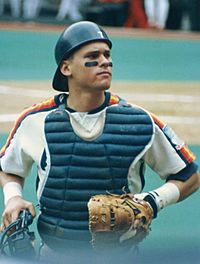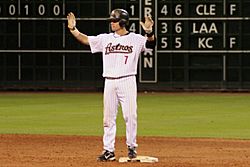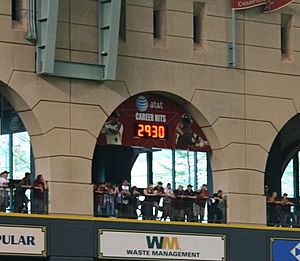Craig Biggio facts for kids
Quick facts for kids Craig Biggio |
|||
|---|---|---|---|
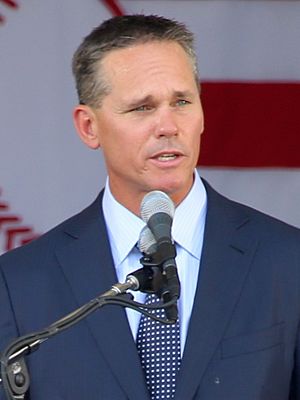
Biggio in 2015
|
|||
| Second baseman / Catcher / Outfielder | |||
| Born: December 14, 1965 Smithtown, New York, U.S. |
|||
|
|||
| debut | |||
| June 26, 1988, for the Houston Astros | |||
| Last appearance | |||
| September 30, 2007, for the Houston Astros | |||
| MLB statistics | |||
| Batting average | .281 | ||
| Hits | 3,060 | ||
| Home runs | 291 | ||
| Runs batted in | 1,175 | ||
| Stolen bases | 414 | ||
| Teams | |||
|
|||
| Career highlights and awards | |||
|
|||
| Induction | 2015 | ||
| Vote | 82.7% (third ballot) | ||
Craig Alan Biggio (born December 14, 1965) is a former American baseball player. He played for 20 seasons in Major League Baseball (MLB) with the Houston Astros. Biggio played from 1988 to 2007. He was a versatile player, playing as a second baseman, outfielder, and catcher.
Biggio was a seven-time National League (NL) All-Star. Many consider him the best all-around player in Astros history. He is the only player to be an All-Star and win a Silver Slugger Award at both catcher and second base. With teammates Jeff Bagwell and Lance Berkman, he was part of the "Killer B's". This group helped the Astros reach the playoffs six times from 1997 to 2005. They made it to the team's first World Series in 2005.
By the end of his career, Biggio had impressive stats. He ranked high in NL history for games played (2,850) and at bats (10,876). He also had 3,060 hits and 1,844 runs scored. His 668 career doubles were the second-most ever by a right-handed hitter. Biggio holds many Astros team records. These include most career games, at bats, hits, runs, and doubles.
He was a four-time Gold Glove Award winner. He led NL second basemen in assists six times. Biggio is one of only five players with 250 home runs and 400 stolen bases. He was the ninth player in the 3,000 hit club to get all his hits with one team. Biggio was also known for being hit by pitch often. His career total of 285 is second in MLB history.
Biggio was a highly respected player. He received the 2005 Hutch Award for his determination. He also got the 2007 Roberto Clemente Award for sportsmanship and community service. The Astros retired his number 7 jersey after he retired. In 2015, Biggio was elected to the National Baseball Hall of Fame. He was the first Hall of Famer shown in an Astros uniform on his plaque. Since 2008, Biggio has worked as a special assistant for the Astros' general manager.
Contents
Early Life and Baseball Beginnings
High School Achievements
Craig Biggio went to Kings Park High School in Kings Park, New York. He was a great athlete in many sports. In 1983, he won the Hansen Award. This award recognized him as the best football player in Suffolk County. However, Biggio loved baseball more. He chose to play baseball at Seton Hall University instead of taking football scholarships.
College Baseball Career
At Seton Hall, coach Mike Sheppard asked Biggio to play catcher. This was because the team needed one. In 1986, he played summer baseball for the Yarmouth-Dennis Red Sox. Biggio was an All-American baseball player at Seton Hall. He played with future MLB stars like Mo Vaughn and John Valentin. Their journey from college to the major leagues was even written about in a book.
The Houston Astros chose Biggio in the first round of the 1987 draft. Biggio still holds Seton Hall records for triples and runs scored. In 1996, he was inducted into the Seton Hall Hall of Fame. His number 44 jersey was retired in 2012.
Major League Baseball Journey
Starting as a Catcher
Biggio joined the Astros as a catcher in the middle of the 1988 season. He had a great batting average of .344 in the minor leagues. In 1989, he became the Astros' main catcher. He also won the Silver Slugger Award that year. Biggio was a very fast runner and good at stealing bases. The Astros even tried him in the outfield part-time in 1990 to help him keep his speed.
The "Killer B's" Era
Before the 1991 season, the Astros got first baseman Jeff Bagwell. Bagwell was a powerful hitter. He played 15 seasons, all overlapping with Biggio's career. Bagwell became Houston's all-time leader in home runs. Biggio and Bagwell became known as the "Killer B's." They were a huge part of the Astros' success in the 1990s and 2000s.
From 1994 to 2003, they were an amazing offensive and defensive duo. They played in nine All-Star Games. They also won five Gold Gloves. The Astros made it to the playoffs six times during this period. Other players whose names started with "B" also joined this group, like Lance Berkman.
Biggio thought about leaving the Astros only once, after the 1995 season. Other teams offered him big contracts. But Biggio decided to stay with the Astros, signing a four-year deal.
Moving to Second Base
The Astros convinced Biggio to become a second baseman in spring training of 1992. This was even though he had been an All-Star catcher the year before. In 1992, Biggio made the All-Star team again. He became the first player ever to be an All-Star at both catcher and second base. It is very rare for a catcher to successfully switch to an infield position.
Biggio became known as a reliable and hardworking leadoff hitter. He had surprising power for a second baseman. He holds the National League record for most home runs to start a game, with 53. Between 1994 and 1999, Biggio led the NL in doubles three times. He also led in runs scored twice and stolen bases once. In 1997, he played a whole season without hitting into a double play. This was a rare achievement in MLB history. He won four straight Gold Glove Awards from 1994 to 1997.
Injuries and Outfield Play
Biggio played 1,800 games without getting injured until August 1, 2000. He suffered a season-ending knee injury. He recovered well in 2001. In 2002, he had a tough year, but he did hit for the cycle on April 8. This means he hit a single, double, triple, and home run in the same game.
In 2003, Biggio moved to center field. This was to make room for a new player at second base. In 2004, he moved to left field. This was to help the Astros' offense. The Astros had a great second half of the season. They made the playoffs and won their first-ever playoff series against the Atlanta Braves. Biggio played a key role in that series. The Astros then played in the 2004 National League Championship Series but lost in a close Game 7.
Later Career and Milestones
First World Series Appearance (2005)
In February 2005, Biggio and Bagwell were inducted into the Texas Sports Hall of Fame. Biggio returned to playing second base in 2005. He hit a career-high 26 home runs. He also reached 1,000 RBI, becoming the second Astro to do so. On September 5, he hit a crucial home run against the Philadelphia Phillies. This helped the Astros win a key game and eventually secure a playoff spot.
The Astros beat the Braves again in the playoffs. They then defeated the St. Louis Cardinals to win their first league championship. After playing their entire careers together, Biggio and Bagwell made their first World Series appearance. They faced the Chicago White Sox, but the White Sox won the series.
Reaching 3,000 Career Hits (2007)
On June 28, 2007, Biggio made history. He became the 27th player in MLB to join the 3,000 hit club. He got his 3,000th hit with a single against the Colorado Rockies. The game paused so Biggio could celebrate with his family. His longtime friend and former teammate Jeff Bagwell came out to congratulate him. Biggio was the first player in Astros history to reach 3,000 hits. He even had five hits in that same game, a rare feat.
The Astros put up a digital counter at their stadium to show Biggio's hit total. He finished his career with 668 doubles, ranking fifth all-time. Biggio is the only player in baseball history with 3,000 hits, 600 doubles, 400 stolen bases, and 250 home runs.
Retirement from Baseball
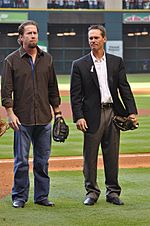
On July 24, 2007, Biggio announced he would retire at the end of the season. This was his 20th season with the Astros, a team record. Hours later, he hit a grand slam in a tied game against the Los Angeles Dodgers. The Astros won that game.
In one of his last games, Biggio started as a catcher for two innings. He also hit a double. On September 30, 2007, a huge crowd came to Minute Maid Park for Biggio's final game. He got his last career hit, a double, in the first inning. He also scored his last career run. When he left the field, fans gave him a standing ovation.
Biggio ended his career with 3,060 hits, 668 doubles, 291 home runs, 1,175 RBI, and 414 stolen bases. His career batting average was .281.
After Retirement
Since 2008, Biggio has been a special assistant to the Astros' general manager. He helps with player development and scouting. He also works with the team's community programs.
Hit by Pitches
Throughout his career, Biggio was often hit by pitches. He broke the modern-era record for career hit-by-pitches in 2005. He finished with 287, second only to Hughie Jennings all-time. Even though he was hit so many times, Biggio never got seriously hurt. He also never charged the pitcher's mound. He even sent an arm guard he wore to the National Baseball Hall of Fame.
Jersey Number Retirement
 |
|
| Craig Biggio's number 7 was retired by the Houston Astros in 2008. |
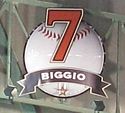
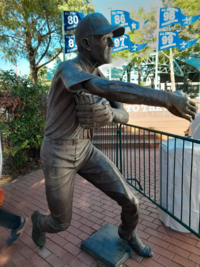
On June 28, 2008, the Astros announced they would retire Craig Biggio's jersey number. His No. 7 jersey was officially retired on August 17, 2008. This happened before a game against the Arizona Diamondbacks. Biggio was the ninth player in Astros history to have his number retired.
Baseball Hall of Fame
Biggio first appeared on the Hall of Fame ballot in 2013. Players need 75% of the votes to be inducted. He received 68.2% of the votes, falling short. The next year, he almost made it, getting 74.8% of the votes.
On January 6, 2015, Biggio was finally elected to the Hall of Fame. He received 82.7% of the votes. He was inducted on July 26, 2015. He was the first member of the 3,000 hit club not to be elected on his first try. In 2021, Biggio was elected to the Hall of Fame's board of directors.
Community Involvement
Biggio has received many awards for his community work. These include the Hutch Award (2005) and the Roberto Clemente Award (2007). The Hutch Award is for players who show determination and never give up. The Roberto Clemente Award recognizes players who show sportsmanship and help their community.
Biggio has been a big supporter of the Sunshine Kids Foundation for over ten years. This organization helps children who are fighting cancer. Biggio raises awareness by wearing a small yellow sun on his cap. He also hosts a celebrity golf tournament and a party for the Sunshine Kids at Minute Maid Park. He has raised over $2 million for the organization.
Personal Life
Biggio married Patty Egan in 1990. They have three children: Conor (born 1993), Cavan (born 1995), and Quinn (born 1999). Cavan has also played in Major League Baseball. From 2008 to 2013, Biggio was the head baseball coach at St. Thomas High School. He led the team to two state baseball titles. Both of Biggio's sons played baseball at St. Thomas and later attended the University of Notre Dame.
Biggio and his family have a home in Spring Lake, New Jersey. Biggio is Catholic.
Awards and Highlights
Recognition
| Title | Date | Ref |
|---|---|---|
| Baseball America Lifetime Achievement Award | 2005 | |
| National Baseball Hall of Fame and Museum inductee | 2015 | |
| Suffolk Sports Hall of Fame inductee | 2002 | |
| Texas Baseball Hall of Fame inductee | 2005 | |
| Texas Sports Hall of Fame inductee | 2005 |
| Name of award | Times | Dates | Ref | |
|---|---|---|---|---|
| Baseball America National League All-Star at second base | 2 | 1994, 1998 | ||
| Branch Rickey Award | 1 | 1997 | ||
| Heart & Hustle Award | 2 | 2007, 2008 | ||
| Houston Astros Most Valuable Player | 1 | 1998 | ||
| Hutch Award | 1 | 2005 | ||
| Major League Baseball All-Star | ||||
| at catcher | 1 | 1991 | ||
| at second base | 6 | 1992, 1994–1998 | ||
| Rawlings Gold Glove Award at second base | 4 | 1994–1997 | ||
| Roberto Clemente Award | 1 | 2007 | ||
| Silver Slugger Award | ||||
| at catcher | 1 | 1989 | ||
| at second base | 4 | 1994, 1995, 1997, 1998 | ||
Statistical Highlights
Notes: Per Baseball-Reference.com. †– led Major Leagues.
| Category | Times | Dates |
|---|---|---|
| Doubles leader | 3 | 1994, 1998†, 1999† |
| Games played leader | 3 | 1992, 1996, 1997 |
| Hit by pitch leader | 5 | 1995†–1997†, 2001†, 2003† |
| Plate appearance leader | 5 | 1992, 1995†, 1997–1999† |
| Runs scored leader | 2 | 1995†, 1997† |
| Stolen base leader | 1 | 1994 |
| Times on base leader | 1 | 1997 |
Other Distinctions
- Holds the National League record for most career lead-off home runs (53).
- He was the second player to have 50 stolen bases and 50 doubles in one season (1998).
- He was the first player in baseball history to not hit into a single double play in a full 162-game season (1997).
- His 146 runs scored in 1997 were the most by an NL player since 1932.
- He hit for the cycle against the Colorado Rockies (April 8, 2002).
- Craig and his son, Cavan, are one of only two father-son duos to hit for the cycle in MLB history.
- He is the Astros' career leader in games played, at-bats, runs scored, hits, doubles, and extra-base hits.
- He holds the record for most regular-season games played (2,564) before his first World Series appearance.
See also
 In Spanish: Craig Biggio para niños
In Spanish: Craig Biggio para niños
- List of second-generation Major League Baseball players
- 3,000 hit club
- Houston Astros award winners and league leaders
- List of Houston Astros team records
- List of Major League Baseball annual doubles leaders
- List of Major League Baseball annual runs scored leaders
- List of Major League Baseball annual stolen base leaders
- List of Major League Baseball doubles records
- List of Major League Baseball career assists leaders
- List of Major League Baseball career doubles leaders
- List of Major League Baseball career hit by pitch leaders
- List of Major League Baseball career hits leaders
- List of Major League Baseball career home run leaders
- List of Major League Baseball career putouts as a second baseman leaders
- List of Major League Baseball career runs batted in leaders
- List of Major League Baseball career runs scored leaders
- List of Major League Baseball career total bases leaders
- List of Major League Baseball career stolen bases leaders
- List of Major League Baseball players who hit for the cycle
- List of Major League Baseball players who spent their entire career with one franchise
- List of Major League Baseball retired numbers
 | Ernest Everett Just |
 | Mary Jackson |
 | Emmett Chappelle |
 | Marie Maynard Daly |


